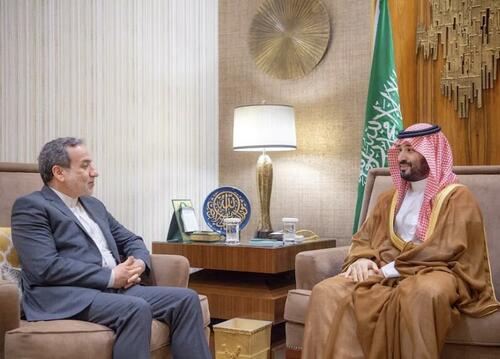
Gulf Cooperation Council (GCC) countries are deeply alarmed by Israel's current threats of launching a major counter-attack on Iran, which would likely involve ballistic missiles and fighter jet strikes on key infrastructure, both energy and military. The Biden White House has this week sought to talk the Israelis down from hitting oil and gas sites.
Gulf countries including Saudi Arabia, Qatar, and United Arab Emirates are now also lobbying the US and Israel to avoid hitting Iran's oil sites, on fears that with such an escalation Tehran would in turn target oil facilities in the Gulf. This was already a reality that played out in the last half-decade of regional proxy conflict between the Iran axis and the West-Gulf country alliance.
The Saudis and GGC states wish to avoid the kind of attacks which could impact its oil production and exports, such as the 2019 Abqaiq–Khurais Saudi Aramco drones strikes. The US blamed Iran for those historic attacks, but Tehran leaders never owned up to it. It may have been done by Iranian proxies out of Iraq, but the West ultimately views that it was Tehran's finger on the trigger.

We detailed last week that the Saudis are attempting convince the Iranians of their neutrality, amid a series of high-level meetings, which recently included President Masoud Pezeshkian visiting Doha to meet with GCC officials. These talks have continued with Crown Prince Mohammed bin Salman Iranian meeting Iranian Foreign Minister Abbas Araqchi on Wednesday amid the latter's Gulf tour.
Reuters has in a new Thursday report revealed more details of dire warnings conveyed from the Iranian side. "The moves by the Gulf states come after a diplomatic push by non-Arab Shi'ite Iran to persuade its Sunni Gulf neighbors to use their influence with Washington amid rising concerns Israel could target Iran's oil production facilities," Reuters writes.
Tehran is basically telling the Saudis to talk the Israelis down, or else...
"During meetings this week, Iran warned Saudi Arabia it could not guarantee the safety of the Gulf kingdom's oil facilities if Israel were given any assistance in carrying out an attack, a senior Iranian official and an Iranian diplomat told Reuters."
A key complication, and one which puts the Saudis in a precarious and delicate position vis-a-vis their allies, is that the United States has bases and a troop presence in the kingdom, including significant US Air Force assets. Washington has already pledged to help the Israelis repel any future Iranian ballistic missile counterattacks, as it did in the last two rounds of drones and ballistic missiles fired on Israel.
A broader Iran-Israel war would certainly see the US pressure the Saudis and GCC to allow American fighter jets based out of the Gulf to engage Iran. According to Reuters, Iran has expressly threatened war should Riyadh cooperate:
Ali Shihabi, a Saudi analyst close to the Saudi royal court, said: "The Iranians have stated: 'If the Gulf states open up their airspace to Israel, that would be an act of war'."
The diplomat said Tehran had sent a clear message to Riyadh that its allies in countries such as Iraq or Yemen might respond if there was any regional support for Israel against Iran.
Both the Shia Houthi out of Yemen and Iraqi paramilitaries have over the years proven themselves capable of hitting Saudi oil facilities with either drones or missiles.
The Saudis appear to be taking steps to appease Iran: "As part of their attempts to avoid being caught in the crossfire, Gulf states including Saudi Arabia, the United Arab Emirates and Qatar are also refusing to let Israel fly over their airspace for any attack on Iran and have conveyed this to Washington, the three sources close to government circles said," Reuters details further.
Agreed. The Abqaiq & Khurais attack was a real turning point. Ever since, near real-time satellite surveillance & tanker tracking have blunted market over-reactions. Market has shrugged off potential (and real) supply risks for a year. Will it end now? Biden comments not helping. https://t.co/EdLkJnPPpP
— Ben Cahill (@bencahillenergy) October 3, 2024
The Saudis and Iranians have over the past couple years made huge strides toward full diplomatic rapprochement, while at the same time Riyadh has drifted away from normalization with Israel in light of the Gaza war.
In terms of oil risk, it must be recalled that the aforementioned 2019 attack on Saudi Aramco's oilfield had shut down over 5% of global oil supply. If Israel targets Iran's supply, OPEC has enough spare oil capacity to make up for it, but not if oil sites in Saudi Arabia and the UAE are hit by any potential attacks from Iranian proxies.
But again, Riyadh is seeking to assure the Islamic Republic: "The Gulf states aren't letting Israel use their airspace. They won't allow Israeli missiles to pass through, and there's also a hope that they won't strike the oil facilities," a Gulf source told Reuters.
Gulf Cooperation Council (GCC) countries are deeply alarmed by Israel’s current threats of launching a major counter-attack on Iran, which would likely involve ballistic missiles and fighter jet strikes on key infrastructure, both energy and military. The Biden White House has this week sought to talk the Israelis down from hitting oil and gas sites.
Gulf countries including Saudi Arabia, Qatar, and United Arab Emirates are now also lobbying the US and Israel to avoid hitting Iran’s oil sites, on fears that with such an escalation Tehran would in turn target oil facilities in the Gulf. This was already a reality that played out in the last half-decade of regional proxy conflict between the Iran axis and the West-Gulf country alliance.
The Saudis and GGC states wish to avoid the kind of attacks which could impact its oil production and exports, such as the 2019 Abqaiq–Khurais Saudi Aramco drones strikes. The US blamed Iran for those historic attacks, but Tehran leaders never owned up to it. It may have been done by Iranian proxies out of Iraq, but the West ultimately views that it was Tehran’s finger on the trigger.

We detailed last week that the Saudis are attempting convince the Iranians of their neutrality, amid a series of high-level meetings, which recently included President Masoud Pezeshkian visiting Doha to meet with GCC officials. These talks have continued with Crown Prince Mohammed bin Salman Iranian meeting Iranian Foreign Minister Abbas Araqchi on Wednesday amid the latter’s Gulf tour.
Reuters has in a new Thursday report revealed more details of dire warnings conveyed from the Iranian side. “The moves by the Gulf states come after a diplomatic push by non-Arab Shi’ite Iran to persuade its Sunni Gulf neighbors to use their influence with Washington amid rising concerns Israel could target Iran’s oil production facilities,” Reuters writes.
Tehran is basically telling the Saudis to talk the Israelis down, or else…
“During meetings this week, Iran warned Saudi Arabia it could not guarantee the safety of the Gulf kingdom’s oil facilities if Israel were given any assistance in carrying out an attack, a senior Iranian official and an Iranian diplomat told Reuters.”
A key complication, and one which puts the Saudis in a precarious and delicate position vis-a-vis their allies, is that the United States has bases and a troop presence in the kingdom, including significant US Air Force assets. Washington has already pledged to help the Israelis repel any future Iranian ballistic missile counterattacks, as it did in the last two rounds of drones and ballistic missiles fired on Israel.
A broader Iran-Israel war would certainly see the US pressure the Saudis and GCC to allow American fighter jets based out of the Gulf to engage Iran. According to Reuters, Iran has expressly threatened war should Riyadh cooperate:
Ali Shihabi, a Saudi analyst close to the Saudi royal court, said: “The Iranians have stated: ‘If the Gulf states open up their airspace to Israel, that would be an act of war’.”
The diplomat said Tehran had sent a clear message to Riyadh that its allies in countries such as Iraq or Yemen might respond if there was any regional support for Israel against Iran.
Both the Shia Houthi out of Yemen and Iraqi paramilitaries have over the years proven themselves capable of hitting Saudi oil facilities with either drones or missiles.
The Saudis appear to be taking steps to appease Iran: “As part of their attempts to avoid being caught in the crossfire, Gulf states including Saudi Arabia, the United Arab Emirates and Qatar are also refusing to let Israel fly over their airspace for any attack on Iran and have conveyed this to Washington, the three sources close to government circles said,” Reuters details further.
Agreed. The Abqaiq & Khurais attack was a real turning point. Ever since, near real-time satellite surveillance & tanker tracking have blunted market over-reactions. Market has shrugged off potential (and real) supply risks for a year. Will it end now? Biden comments not helping. https://t.co/EdLkJnPPpP
— Ben Cahill (@bencahillenergy) October 3, 2024
The Saudis and Iranians have over the past couple years made huge strides toward full diplomatic rapprochement, while at the same time Riyadh has drifted away from normalization with Israel in light of the Gaza war.
In terms of oil risk, it must be recalled that the aforementioned 2019 attack on Saudi Aramco’s oilfield had shut down over 5% of global oil supply. If Israel targets Iran’s supply, OPEC has enough spare oil capacity to make up for it, but not if oil sites in Saudi Arabia and the UAE are hit by any potential attacks from Iranian proxies.
But again, Riyadh is seeking to assure the Islamic Republic: “The Gulf states aren’t letting Israel use their airspace. They won’t allow Israeli missiles to pass through, and there’s also a hope that they won’t strike the oil facilities,” a Gulf source told Reuters.
Loading…




